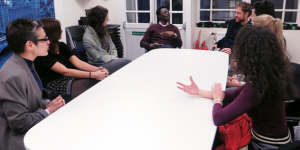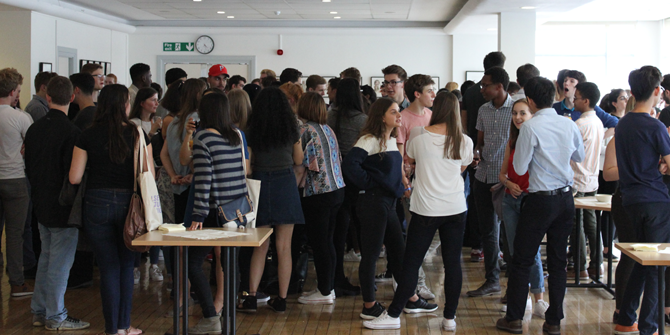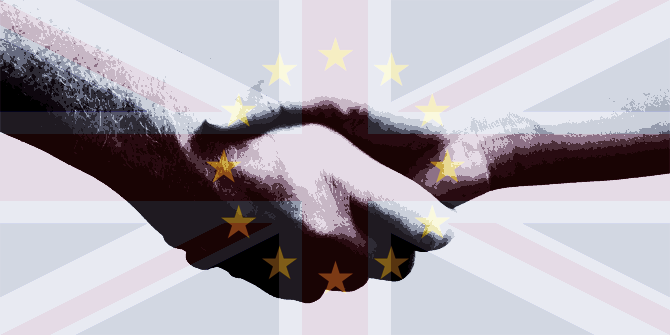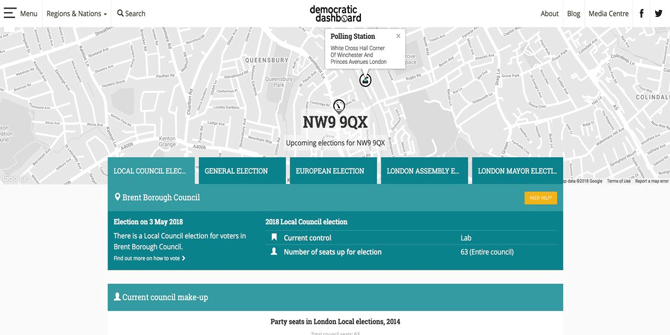
Paola Romero takes an in-depth look at the ideas discussed at the ‘Thinking Across Borders’ mini-course the Department of Government hosted in February.
Thinking Across Borders
In February the LSE Department of Government hosted a two-day mini-course as part of a three-year Leverhulme Trust funded research project. Led by Dr Martin Odei Ajei from the Philosophy Department of the University of Ghana and organized by project director Professor Katrin Flikschuh, ‘Thinking Across Borders’ gave a group of graduate students, including myself, the opportunity to discuss some of the key concepts and ideas of contemporary African philosophy.
Each session invited us to discuss two key themes in African philosophy: the meaning of the ‘person’ and the notion of the ‘self’ in African metaphysics, and the challenges of ‘statehood’ and post-colonial mentality in African political theory. Having studied the articles on the carefully selected course reading list, we embarked on an exciting discussion that pushed us well beyond theoretical concerns.
I think that one of the things that made the course so rewarding was the disposition of the group to engage with these issues not from an outsider’s perspective, seeing them either as alternatives to Western thought, or as alien positions to the current canon. Rather, the spirit of the sessions was to work from within the problems themselves, taking them as starting points for further methodological, philosophical, and normative evaluations.
The Akan concept of ‘personhood’
The first session began with an overview of the metaphysics of the self and the notion of personhood as presented by the Akan philosophy of West Africa. In this case ‘self’ and ‘person’ are inter-related concepts given that, for the Akans, the ‘self’ is a unity of three parts that in turn constitutes a human being as a person within a community. We can readily see some problems here: what holds this unity together? How should these parts be understood –as material or immaterial entities? How does this social and political constitution of the person come about from a metaphysical understanding of the self? Is personhood then a striving ideal from which some fall-short?
Dr. Ajei set the stage for answering these questions by offering some general definitions: The okra (soul) is the principle of life in each person and the vessel of her destiny (nkrabea). Most importantly, the okra carries the spark of the Supreme Being that is present in each of us, as the mark of equality we bear in virtue of being human. The second spiritual component of the person is the sunsun (spirit), which represent ideas such as the personality and character of the individual. This drives our presence in the world and is the activating principle of the soul’s workings. Therefore the sunsun is the dynamic force of the self, whereas the okra is a constant element crafted by the God-demiurg.
Without trying to equate the concept with Freudian correlatives or with Aristotelian categories, I understood the sensun to be that dynamic element in a person’s being, such that when someone enters a room and interrupts a tedious philosophical debate we say “His sunsun is heavy or weighty” (ne sunsun ye duru). It should be noted that such an abrupt presence was not needed to awake us from our slumber, as our sunsuns were in good shape for the rest of the afternoon’s discussion.
One problematic aspect of the sunsun is that, as the subject of experience, it cannot be reduced to the subject of thought in the fashion of the Cartesian cogito. We needed a pause to dwell on this issue. Ajei called our attention to the fact that, in Akan philosophy, mind as adwene – here ‘mind’ and ‘thought’ are equivalent as the noun form of the verb dwen (‘to think’) – has to do with the cognitive and logical aspects of thought, and not with the experiential aspects we attribute to the Cartesian cognosere of the thinking subject.
As emphasised by Kwasi Wiredu, the mind is not taken as a substance, and for this reason cannot figure as a constituent of the person. As I understand it, the resistance to make thought a substantive part of the structure of the person is not merely a matter of ontological purity on the part of philosophers, but it rests on a foundational negativity of the Akan way of thinking to reduce the person to a Cartesian thinking soul, that pullulates freely from experiential and social constraints.
As Ajei pointed out, there is a certain ‘determinism’ in Descartes, according to which we are ‘just mind’, which doesn’t sit well with the nuances of Akan’s view on human destiny as a task to be accomplished in a moral and social context. The two realms of experience delimited by part of the Western tradition – I venture to name them the realm of Freedom, and the realm of Nature – are experienced here by one and the same subject, thus radically debunking the dualism of mind and body.
Thus resolving the question of the nature of the okra (soul) and the sunsun (spirit) raises an existential question, to the extent that it bears on the possibility of a life after death, the immortality of the okra, and its persistence in the asamando (the world of spirits). It was striking for us to learn how this cosmogony blurs the fixated distinctions between life and death, and by the same token, the strict Cartesian view on mind and body interaction. That the okra remains ‘alive’ after the body has perished retains, I take it, a robust and vital sense of existence, and the somehow paradoxical possibility of being in space and time whilst also being immaterial and body-less.
 Discussion proceeded into a debate about the normative implications of this basic structure of the person. It was noted that, a tendency found in Western talk about personshood and personal identity seems to espouse a view about rights: Isn’t it implied in the conception of a person that it is, accordingly, a ‘bearer of rights’? What are the justifications for such a view? Can we accommodate this idea within the Akan view on the person?
Discussion proceeded into a debate about the normative implications of this basic structure of the person. It was noted that, a tendency found in Western talk about personshood and personal identity seems to espouse a view about rights: Isn’t it implied in the conception of a person that it is, accordingly, a ‘bearer of rights’? What are the justifications for such a view? Can we accommodate this idea within the Akan view on the person?
Most of the comments revolved around this interesting, yet morally challenging idea, that personhood is not a fixed status of human beings, but the efforts of each individual to assimilate her existence to that of her community, to uphold its values, and to have an eye on the common good over her individual interests and desires. In this sense, the African conception of personhood is one of degrees, achieved by the laborious effort of becoming ‘that who you are’. This forced us to challenge our own views on the justifications of human rights, by taking a step back into the kind of ‘self’ we take for granted and assume as the bearer of these rights. Equality may be better understood as an achievement, rather than as a philosophical stipulation.
The notion of statehood
On the second session, we dealt with the notion of statehood, and the post-colonial challenges of ‘nation building’ in African political theory. Ajei mapped the different ways in which the role of the state, and the relation these newly independent nations should have with the rest of the geo-political spectrum. I think that the urgency of these issues was made manifest in the students interest to compare the African case with other countries, drawing on personal experiences.
Doubts were raised about Kwame Nkrumah’s dictum voiced after the independence euphoria in the 50s and 60s singing: ‘Seek first the political kingdom and all else will be added on to you.’ Is territorial and political independence a sufficient condition to guarantee other forms of independency, e.g economical and cultural? Can’t we see the perennial presence of external agents (be these structural or contingent) in Africa’s attempt at self-determination? As Dr Ajei & Professor Flikschuh have written previously, two worries still hold: the persistence of the effects of colonial practices, and the more subterranean persistence of “abiding colonial practices and assumptions” in a conceptual scheme, rooted in practices that perpetuate rather than transform the colonial heritage.
As with all good discussions, ours ended with many questions, and open-ended answers. We acknowledged that, when talking about post-colonialism we should not only look for its effects and manifestations in discussions strictly dealing with state-issues and nation building, but we should turn to the mind-set of the actors at play in this dynamic. Finally, Professor Flikschuh & Dr Ajei recalled their shared efforts to define this problem as one of a “colonial mentality” that runs both ways: from a position of upheld superiority of the descendant of the colonizers, as well as an internalized inferiority on the side of the descendant of the colonized.
By the end of the discussion we realised that breaking free from the logic of these mind-sets demands a serious philosophical engagement with questions that are closer to moral philosophy and the psychology of the self, than with tailored-made puzzles more akin to current methodologies of Western political theorising.
Mini-course reading list
On personhood:
- Kwame Gyekye, 1995, Essay on African Philosophical Thought: The Akan Conceptual Scheme, Philadelphia: Temple University Press
- Kwasi Wiredu, 1983, “The Akan Concept of Mind.” Ibadan Journal of Humanistic Studies
- Safro Kwame, “Quasi-materialism: A Contemporary African Philosophy of Mind, in (ed) Kwasi Wiredu, A Companion to African Philosophy, Malden: Blackwell, 343-354
- Mohammed Majeed, 2013, “A Critique of the Concept of Quasi-Physicalism in Akan Philosophy”, in African Studies Quarterly Volume 14, Issues 1 & 2 November 2013
On the state:
- Claude Ake, 2000, “The State in Contemporary Africa”, in Nnoli, O, (ed.) Government and Politics in Africa. Harare: AAPS Books; pp. 57-65
- Hahmood Maindani, 2000. “Democratic Theory and Democratic Struggles in Africa, in Nnoli, O, (ed.) Government and Politics in Africa. Harare: AAPS Books. Pp. 220-239
- Obiora Chinedu Okafor, 2000, Re-Defining Legitimate Statehood: International Law and State Fragmentation in Africa, The Hague: Martinus Nijhoff; pp. 30-39, 92-114
 Paola Romero is a PhD research candidate in Political Theory in the Department of Government.
Paola Romero is a PhD research candidate in Political Theory in the Department of Government.
Note: this article gives the views of the author, and not the position of the Department of Government, nor of the London School of Economics.





